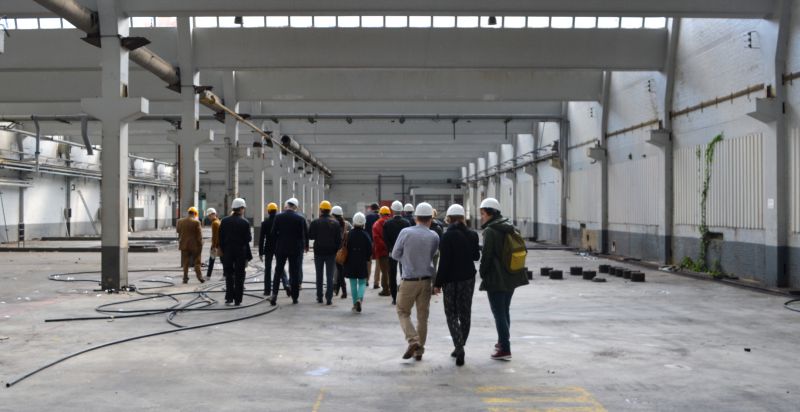
picture: Veva Roesems
Labo XX_werk is exhibited at IABR–2016–THE NEXT ECONOMY
by invitation only

picture: Veva Roesems
Hackable City Plot Buiksloterham Meetup discusses the intentions for building a truly resilient district. The main question of the meeting will be whether and how the adopted development path can be continued.
By invitation only.
How to share resilient city making process with institutions in order to further good policy making? How can values like sustainability and innovation take up their rightful place? How to encourage communities to think about the use of metrics to strengthen their position towards institutions?
An expert meeting / workshop open to audience.
WEDNESDAY 25 MAY
Time: 2 p.m.
Language: Dutch
Sharing and recalibrating expertise and knowledge of Cityplot Buiksloterham and The Flexible City with stakeholders of post-industial areas that are ready to be transformed.
Workshop by invitation only
Getting to meet new people, getting reacquainted, developing relationships, sharing ideas, networking (or not working): the essence of a good Friday afternoon get-together is to enjoy spending time together to start the weekend.
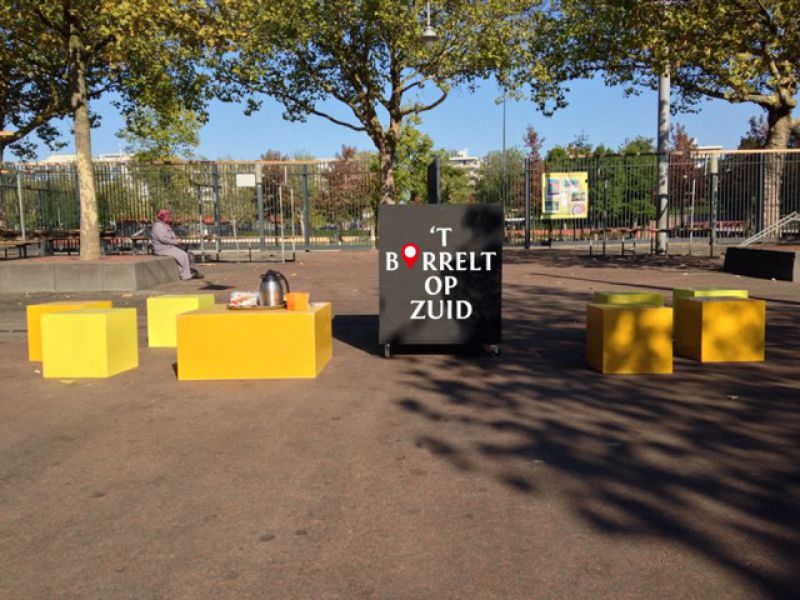
© Freehouse
In effervescent Rotterdam South, people are getting together. It’s about time for the South to stop heading the wrong listings and start appearing on the right, positive ones. As a place where residents and businesses work together to make good things happen, where people can have a good time together, and where you can run into friends, music, good food, and street.
Get-togethers will take place in different locations in the shopping area around Pretorialaan and Paul Krugerstraat. Using the squares, existing street furniture, and local hospitality industry, the Afrikaanderwijk Cooperative hosts a Friday afternoon get-together every third Friday of the month. Together with local businesses, it shows what the Afrikaanderwijk has to offer and how much fun it can be. Time to notice for Rotterdam that South is getting (it) together!
FRIDAY 20 MAY
Time: 4 - 7.30 p.m
Location: Afrikaanderplein, across from Pretorialaan 25/27
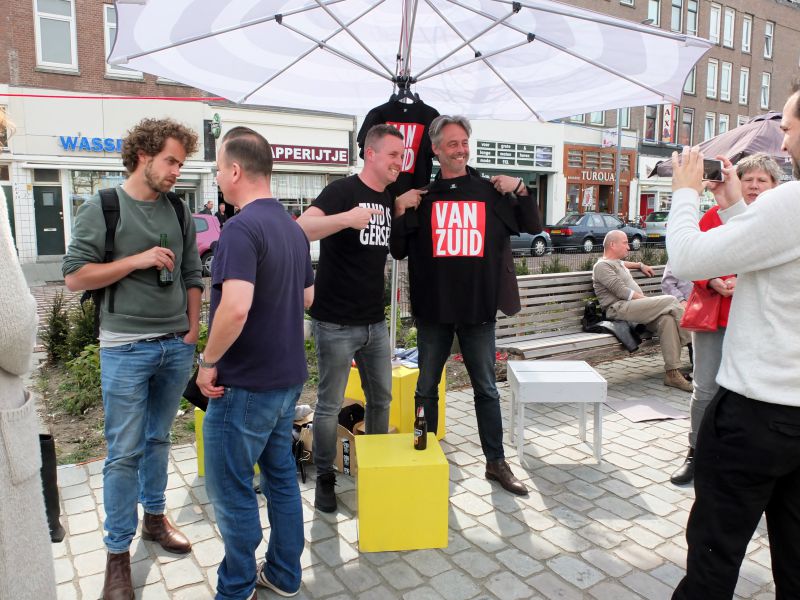
In sparkling Rotterdam South, people are getting together. It’s about time for the South to stop heading the wrong listings and start appearing on the right, positive ones. As a place where residents and businesses work together to make good things happen, where people can have a good time together, and where you can run into friends, music, good food, and street.
Get-togethers will take place in different locations in the shopping area around Pretorialaan and Paul Krugerstraat. Using the squares, existing street furniture, and local hospitality industry, the Afrikaanderwijk Cooperative hosts a Friday afternoon get-together every third Friday of the month. Together with local businesses, it shows what the Afrikaanderwijk has to offer and how much fun it can be. Time to notice for Rotterdam that South is getting (it) together!
FRIDAY 17 JUNE
Time: 4 - 7.30 p.m.
Location: Afrikaanderplein, across from Pretorialaan 25/27
After eleven weeks of more than 150 conferences, lectures, workshops, brainstorming sessions and debates, the question is: Now, What’s Next?
On 23 April 2016, the seventh edition of the International Architecture Biennale Rotterdam, IABR–2016–THE NEXT ECONOMY, about the relationship between spatial design and the economy of the future, opened its doors. After eleven weeks of debate by designers and academics, administrators and policy makers, stakeholders and entrepreneurs, city dwellers and audiences from the Netherlands and abroad, the program WHAT’S NEXT? closes on 3 July by striking a final chord: NOW, WHAT’S NEXT? What have we learned? And what can we pass on to the designers that continue to work on the city of tomorrow?
NOW, WHAT’S NEXT? starts at 2 p.m. at the auditorium of the IABR–2016, at the heart of the exhibition, and consists of two parts: a final Next Steps with Ruimtevolk, and the last Next Salon.
In recent weeks, the series Next Steps with Ruimtevolk confirmed yet again that other ways of making city are needed if we want to see our cities CO2 neutral, socially inclusive and productive. These major challenges not only require new ways of funding and governance, but renewed and alternative design and planning practices as well. Designers, it was felt, should be more concerned with the role design can play in the solving of social issues. How can we connect long-term strategies and large-scale programs to regional and local challenges? What part can design play in connecting ambitions, scale levels and parties? Can design contribute to the development of new governanceand funding models? On 3 July, Ruimtevolk’s Sjors de Vries addresses the question What’s Next? one final time and he is answered by, among others, Kim Putters (director The Netherlands Institute for Social Research), Hans Tijl (director Spatial Development, Ministry of Infrastructure and the Environment), Elma van Boxel (ZUS Zones Urbaines Sensibles), Joachim Declerck (partner AWB and member of Curator Team IABR–2016) and Indira van ’t Klooster (ArchitectuurLokaal).
After the break, Maarten Hajer examines the most urgent issues he distills from the debate held during the IABR–2016. With Mark Swilling (guest curator Urban Africa, IABR–2016), he discusses general highlights of ten weeks of program, including crucial issues of how to getto new, sustainable forms of urban development, and if we can go ‘beyond gentrification’. With Maike Boggemann (Project Manager Strategy and Scenarios Team at Shell) he discusses the role design plays and can play in major social transitions, more specifically, the impact of the IABR–Atelier 2050–An Energetic Odyssey. With Nahyun Hwang (Adjunct Assistant Professor in Architecture at Columbia University and partner at NHDM Architecture Urbanism, New York), he looks ahead at ‘the city as a campus’. With Freek Persyn (partner 51N4E and Curator Team IABR–2016) he elaborates on the role of design as an instrument for urban dialogue, with reference to projects in Tirana and Brussels. And with urban sociologist Arnold Reijndorp, he talks about a new public domain for Rotterdam South.
After these two sessions, at 5.30 p.m., the conclusions of the afternoon are presented to a panel of designers: Nathalie de Vries (founding partner MVRDV, chairperson Association of Dutch Architects and professor at the Baukunstklasse of the Düsseldorf Art Academy), Rients Dijkstra (founder Maxwan, government advisor on Infrastructure and the City, Professor Urban Design Delft University of Technology) and Joachim Declerck (partner AWB, Curator Team IABR–2016). Their response is also a call to the profession and to policy makers: now, what’s next?
The exhibition THE NEXT ECONOMY is open from 12 p.m. to 7 p.m. There are guided tours and there is special attention for the IABR–2016 program Next Op Zuid. The ‘Kaart van Zuid’ presents a first selection of responses to its open call for ideas for the public space of Rotterdam-South. And our caféserves a lunch comprising 100 percent local products.
Admission to IABR–2016–THE NEXT ECONOMY is free this Sunday only. We recommend you to reserve your ticket in advance at our online ticket shop.
For more information and program updates, please visit www.iabr.nl
Date: Sunday 3 July 2016
Time program: 2 p.m. – 6.00 p.m.
Location: Fenixloods II, Paul Nijghkade 19, Rotterdam
Language: Dutch (before the break) and English (after the break)
Admission is free, we recommend you to reserve your ticket in advance at our online ticket shop
Opening hours exhibition: 12 p.m. – 7 p.m.
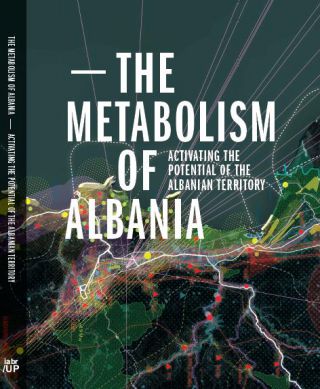
published by iabr/UP
In this session, the book and main results will be presented. With among others George Brugmans (IABR), Dirk Sijmons (HNS Landscape Architects), Adelina Greca (director AKPT), Joni Baboci (Head of Planning Tirana), Freek Persyn (51N4E) and Marieke Francke (iabr/UP)
NEXT SALON #2 – REFUGEES IN THE CITY
From Refugee Crisis to Refugee Economies: on social-economic perspective for refugees
Next Salon #2 is about how refugees can be integrated in our economies, here and elsewhere. This urgent issue brings home the larger and more structural global challenge of how to integrate economic migrants into the Next Economy.
Recently, the main guest, Dutch Government Architect Floris Alkemade, in cooperation with the Central Agency for the Reception of Asylum Seekers launched the competition “A Home Away from Home” with the design assignment of finding new architectural solutions for housing asylum seekers. What’s his vision? And what ideas and new insights did the competition yield? What strategic options are there?
Tamira Combrink, chairwoman of ‘Stichting Noodzaak’ (literally: Foundation of Necessity), explains how the Foundation not only transforms vacant buildings into full-fledged housing for refugees, but also makes accomplishes that living expenses are covered by creating smart links with small local entrepreneurs and refugees are no longer dependent on subsidies. An independent home for refugees.
Housing refugees is an urgent task, but just as urgent is the need for new ideas and viable methods for socioeconomic integration. There are hardly any success stories as refugees are being excluded from the labor market as a rule and become dependent on social assistance benefits. Are there initiatives that manage to support refugees finding a job or providing them with the perspective of meaningful employment and at least a basic income? And what role can spatial design play?
Femke Bijlsma from Refugee Company will join the conversation and explain the working method of this innovative foundation, which provides refugees with meaningful work.
After highlighting the situtaion in the Netherlands, the conversation takes on a more international perspective. Merve Bedir is involved in projects that provide refugees with socio-economic perspective and that change their role and perception in society from being guest to becoming host and hostess. Like 'MATBAKH | MUTFAK ': an integrated garden, kitchen and restaurant run by refugees and producing food for the inhabitants of Gaziantep in Eastern Turkey.
Sociologist, writer and filmmaker Shervin Nekuee, who emigrated from Iran at the age of 19, will present a spoken column. And Amer Shanati, who emigrated from Syria to the Netherlands in 2014, will play the oud.
SUNDAY 22 MAY
Time: 2.30 - 4 p.m.
Location: Fenixloods II, Paul Nijghkade 19, Rotterdam
Language: English
Admission fee: none, provided you can produce a valid exhibition ticket.
A reservation in advance is highly recommended and can be made here.
On four Sunday afternoons, Dutch and international guests will join Maarten Hajer in a relaxed setting as he – informed by columns and (film) images – zooms in on current events that have an impact on the debate on the Next Economy.
NEXT ECONOMY! NEXT PLAN?
IABR–2016–THE NEXT ECONOMY presents us with a number of challenges when claiming that the urban economies of the future need to be inclusive, productive and circular. Cities do have ambitions, but how can these be translated into (spatial) strategies? What does cerating new narratives of the circular, healthy and productive city mean for spatial planning and design? Is the current paradigm of a decentralized and bottom up development successful, or do we need new approaches to spatial planning and governance and innovative alternative design practices?
with Henk Ovink (Special Envoy for International Water Affairs), Jeroen de Willigen (Chief Architect Municipality of Groningen, partner De Zwarte Hond), Ivonne de Nood (Manager Spatial Development Oosterwold, Almere), Steven Delva (Buiksloterham, Buiksloterham, DELVA Landscape Architects / Urbanism) and Martijn Duinveld (Wageningen University).
TUESDAY 26 APRIL
Time: 7.30 - 9 p.m.
Location: Fenixloods II, Paul Nijghkade 19, Rotterdam
Language: Dutch
Admission fee: none
A reservation in advance is highly recommendable and can be made here.
On six Tuesday evenings, RUIMTEVOLK and the IABR will highlight the issues raised by the quest for the Next Economy. How do designers, administrators, and professionals, active on the local, regional, national or international scale, tackle the issues the IABR–2016 raised: the energy transition, the healthy city, and the productive city? How can designers contribute to the reduction of the spatial separation between the disadvantaged and the winners, to a more inclusive city? How can design contribute to an urban economy that adds local value and is circular? In short, which are the concrete Next Steps for design, planning, and governance?
THE CITY AS WORKSHOP
The Next Economy makes a plea for an inclusive urban economy. An economy that not only focuses on knowledge and services but that also fosters (the reintroduction of) production and manufacturing as valuable and meaningful sources of employment. How can we accommodate the return of manufacturing to our cities? How can cities and neighborhoods benefit from more local production? Which spatial conditions stimulate productive cities? And how can design contribute to inclusive urban economies?
with Joachim Declerck (partner Architecture Workroom Brussel), Joris Tiebout (CEO Abattoir Brussels), Imke Carsouw-Huizing (executive directeur Brainport Development), Nicoline van Enter (SLEM Waalwijk) and Vincent Cardinaal (Vers Beton).
TUESDAY 10 MAY
Time: 7.30 - 9 p.m.
Location: Fenixloods II, Paul Nijghkade 19, Rotterdam
Language: Dutch
Admission fee: none, provided you can produce a valid exhibition ticket.
A reservation in advance is highly recommendable and can be made here.
On six Tuesday evenings, RUIMTEVOLK and the IABR will highlight the issues raised by the quest for the Next Economy. How do designers, administrators, and professionals, active on the local, regional, national or international scale, tackle the issues the IABR–2016 raised: the energy transition, the healthy city, and the productive city? How can designers contribute to the reduction of the spatial separation between the disadvantaged and the winners, to a more inclusive city? How can design contribute to an urban economy that adds local value and is circular? In short, which are the concrete Next Steps for design, planning, and governance?
THE ENERGY TRANSITION: A CALL FOR NEW DESIGN PRACTICES
The transition towards an energy-neutral society is one of the major challenges of the coming decades. And a goal that the international community has committed itself to after signing the Climate Change Agreement in Paris. The transition towards renewable energy will have an enormous spatial impact. How do we develop shared perspectives on the desired outcomes? What is the role of national governments and cities? And can designers take the lead in researching, testing and imagining the paths to possible solutions?
with Dirk Sijmons (H+N+S Landscape Architects), Roeland van der Schaaf (Alderman in Groningen), Pallas Agterberg (Director Strategy, Alliander), Isabelle Vries (Senior Strategist, Port of Rotterdam) and Rick Bosman (researcher DRIFT).
TUESDAY 24 MAY
Time: 7.30 - 9 p.m.
Location: Fenixloods II, Paul Nijghkade 19, Rotterdam
Language: Dutch
Admission fee: none.
A reservation in advance is highly recommendable and can be made here.
On six Tuesday evenings, RUIMTEVOLK and the IABR will highlight the issues raised by the quest for the Next Economy. How do designers, administrators, and professionals, active on the local, regional, national or international scale, tackle the issues the IABR–2016 raised: the energy transition, the healthy city, and the productive city? How can designers contribute to the reduction of the spatial separation between the disadvantaged and the winners, to a more inclusive city? How can design contribute to an urban economy that adds local value and is circular? In short, which are the concrete Next Steps for design, planning, and governance?
HEALTHY NEIGHBORHOODS: DESIGNING FOR HIGHER LIFE EXPECTANCY
IABR–2016–THE NEXT ECONOMY calls for healthy and inclusive cities. The IABR–Atelier Utrecht has demonstrated that even in cities that seem healthy on the level of the municipality, the difference in life expectancy within the municipality, between neighborhoods, can be surprisingly large. How do we design cities which provide equal life expectancy for all? What are the (spatial) parameters to work with? And what does this require of designers?
With Hetty Linden (Director Public Health, Municipality of Utrecht), Els Vervloesem (Partner Architecture Workroom Brussels), Martin Dijst (Professor Human Geography and Planning, University of Utrecht), Ad de Bont (Urhahn Urban Design and Strategy) and Ton van Rietbergen (Researcher, University of Utrecht).
TUESDAY 31 MAY
Time: 7.30 - 9 p.m.
Location: Fenixloods II, Paul Nijghkade 19, Rotterdam
Language: Dutch
Admission fee: none.
A reservation in advance is required and can be made here.
On six Tuesday evenings, RUIMTEVOLK and the IABR will highlight the issues raised by the quest for the Next Economy. How do designers, administrators, and professionals, active on the local, regional, national or international scale, tackle the issues the IABR–2016 raised: the energy transition, the healthy city, and the productive city? How can designers contribute to the reduction of the spatial separation between the disadvantaged and the winners, to a more inclusive city? How can design contribute to an urban economy that adds local value and is circular? In short, which are the concrete Next Steps for design, planning, and governance?
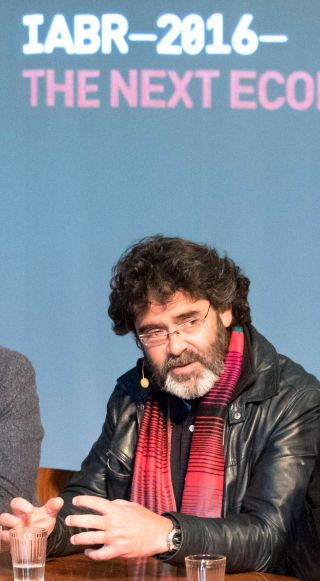
picture: Hans Tak
Mark Swilling is a member of UNEP's International Resource Panel and Distinguished Professor of Sustainable Development at Stellenbosch University, Cape Town. He is also involved with the Stellenbosch Centre for Complex Systems in Transition, and one of the guest curators of Urban Africa; What's Next? integrated in the main exhibition of IABR–2016.
FRIDAY 29 APRIL
Time: 5.30 - 7 p.m.
Location: Fenixloods II, Paul Nijghkade 19, Rotterdam
Language: English
Admission fee: none, provided you can produce a valid exhibition ticket.
Making a reservation in advance is highly recommended. Please go to our online ticketshop here.
Every Friday afternoon, a Next Talk will take place in the auditorium of THE NEXT ECONOMY-exhibition. Radical and provocative ideas for the future of the city are given a platform. International speakers stimulate and intensify the debate about the Next Economy.
Quick bite after a Next Talk? Tasty vegetarian soups are served with bread, beer, wine and water until 10 p.m. at Gallery Robert van Oosterom. Gallery Robert van Oosterom is situated at the ground floor of the Fenixloods II, next to the IABR–2016.
Keller Easterling: ‘Extrastatecraft – The Logistics of the Next Economy’
Infrastructure space is not an infrastructure of pipes and wires under the ground, but something like an operating system for shaping the city. It is coded with laws, econometrics, informatics, global standards and formulas for making spatial products. Everybody has seen it: the cartoon of skyscrapers, malls, resorts, franchises, parking lots, golf courses, airports and airport lounges, free zones. Not an infrastructure that is hidden – far from it – it is pressing into view and everywhere looking the same, whether it is in Texas or in Taiwan. Some of the world’s most radical changes are being written in the language of this matrix space, so much so that is has become a de facto medium of polity. It is the secret weapon of some of the world’s most powerful players.
In this Next Talk, writer, urbanist and architect at Yale, Keller Easterling addresses infrastructure space as a structuring element in the Next Economy. How can we connect the digital infrastructure to the physical infrastructure? How can we reconfigure this generic operating system to develop socially inclusive and environmentally sound urban economies?
Respondent for the lecture is Reinier de Graaf, architect and partner at AMO/OMA.
Keller Easterling is an American architect, urbanist, writer, teacher and currently Professor of Architecture at Yale University. She has written extensively on organization space and infrastructure space. Her book ‘Extrastatecraft: The Power of Infrastructure Space’ serves as the starting point for her Next Talk.
From the digital archives of the IABR: CORPORATE CITIES, an interview with Keller Easterling in the context of the 3rd IABR, POWER - PRODUCING THE CONTEMPORARY CITY (2007).
WARNING: this is a low res video
FRIDAY 6 MAY
Time: 5.30 - 7 p.m.
Location: Fenixloods II, Paul Nijghkade 19, Rotterdam
Language: English
Admission fee: none, provided you can produce a valid exhibition ticket.
Making a reservation in advance is highly recommended. Please go to our our online ticketshop here.
Every Friday afternoon, a Next Talk will take place in the auditorium of THE NEXT ECONOMY-exhibition. Radical and provocative ideas for the future of the city are given a platform. International speakers stimulate and intensify the debate about the Next Economy.
Quick bite after a Next Talk? Tasty vegetarian soups are served with bread, beer, wine and water until 10 p.m. at Gallery Robert van Oosterom. Gallery Robert van Oosterom is situated at the ground floor of the Fenixloods II, next to the IABR–2016.
Francine Houben: Learning Environments
Learning environments play an increasingly important role in the urban economy; education and the city need each other. In the past, universities and colleges were often approached as isolated building projects. Today, we talk about ‘innovation environments’ that raise the spatiostrategic question of how education, commercial activity, and other public functions can be knit together. Ideally, this is done in a way that creates a sustainable vital public domain, where creativity thrives and is permanently appreciated. What are the new learning environments that cleverly combine knowledge and testing platforms, startups, and free zones? How can educational institutions transform into dynamic anchor points of the urban economy? Will they be able to train people for jobs that haven’t been created yet, rather than for jobs that no longer exist?
Based on her award winning designs for the Library of Birmingham, the Delft University of Technology Library, and Amsterdam University College, Francine Houben will discuss her views on education, the city and the Next Economy.
Respondent for the lecture is Jet Bussemaker, the Dutch Minister of Education, Culture and Science (subject to change)
Francine Houben is the founding partner and creative director of Mecanoo architecten, based in Delft, The Netherlands. Her work has received international critical acclaim, each project illustrating the three fundamental elements of her architectural vision: people, place, purpose. She currently leads the renovation of the Midtown Campus of the New York Public Library and the revitalization of the Martin Luther King Jr. Memorial Library in Washington DC.
In November 2015 Queen Máxima of the Netherlands presented the Prins Bernhard Cultuurfonds Prize to Francine Houben for her oeuvre.
Francine Houben was curator for the first edition of the IABR, Mobility: A Room with a View, in 2003.
FRIDAY 13 MAY
Time: 5.30 - 7 p.m.
Location: Fenixloods II, Paul Nijghkade 19, Rotterdam
Language: English
Admission fee: none, provided you can produce a valid exhibition ticket.
A reservation in advance is highly recommended and can be made here.
Provocative Friday afternoon lectures by famous thinkers Every Friday afternoon, a Next Talk will take place in the auditorium of THE NEXT ECONOMY-exhibition. Radical and provocative ideas for the future of the city are given a platform. International speakers stimulate and intensify the debate about the Next Economy.
Jack Self: Home Economics
In his lecture Jack Self will ask urgent questions about the future of housing. Can the house ever escape its economic status as an asset? Should our homes still be considered private spaces? How do new types of families and households produce new spatial needs? What are the models of ownership, finance and work that make these conditions possible? Jack explores the moral, political and economic ramifications of property and ownership in neoliberal debt economies, and asks what role the architect might play in addressing widening social and spatial inequality in the built environment.
Respondent is Hugo Priemus (73), recognized authority in the field of Dutch Public Housing who has been attached to the Technical University of Delft for more than 50 years.
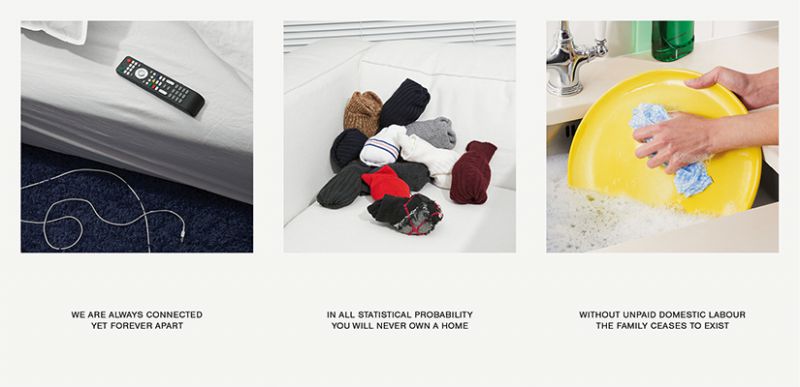
@Jack Self
Jack Self (1987) is an architect and writer based in London. He is Director of the REAL foundation and curator of the 2016 British Pavilion at the Venice Biennale. He has edited a number of architecture magazines and books and founded several, most notably Fulcrum which to this day remains the world's most read student publication about architecture.
FRIDAY 20 MAY
Time: 5.30 - 7 p.m.
Location: Fenixloods II, Paul Nijghkade 19, Rotterdam
Language: English
Admission fee: none, provided you can produce a valid exhibition ticket.
A reservation in advance is highly recommendable and can be made here.
Every Friday afternoon, a Next Talk will take place in the auditorium of THE NEXT ECONOMY-exhibition. Radical and provocative ideas for the future of the city are given a platform. International speakers stimulate and intensify the debate about the Next Economy.
Quick bite after a Next Talk? Tasty vegetarian soups are served with bread, beer, wine and water until 10 p.m. at Gallery Robert van Oosterom. Gallery Robert van Oosterom is situated at the ground floor of the Fenixloods II, next to the IABR–2016.
The opening of the exhibition THE NEXT ECONOMY on 23 April also marks the beginning of ten weeks of discussion and exchange about the future of the city. WHAT'S NEXT? starts on Saturday afternoon with an introduction by IABR-director George Brugmans, a speech by Rotterdam's mayor Ahmed Aboutaleb, and three panel discussions, guided by Maarten Hajer, on the three main themes of IABR–2016: the productive and inclusive city, the healthy and cooperative city, and the green sustainable city.
There is also a continuous program of presentations by guests of and participants in the IABR 2016.
1 pm approx: Panel 1: THE PRODUCTIVE AND INCLUSIVE CITY
In cities there is a renewed interest in a local manufacturing economy. New opportunities are provided by the emergence of smart technologies, the ambition to develop a circular economy, reshoring (bringing manufacturing back home), and an increasing public demand for (local) craftsmanship. How can spatial quality and the urban economy reinforce one another, and who creates and benefits from a productive city? And how do we connect new dynamics to the existing informal economy?
With, among others, Jeanne van Heeswijk (artist and founder of the Freehouse Foundation and the Afrikaanderwijk Cooperation in Rotterdam), Fernando de Mello Franco (architect, currently the City Councilor of Urban Development of São Paulo, and member of the Curator Team of the 5th IABR: Making City) and Daan Zandbelt (partner De Zwarte Hond and Lead Designer of the IABR–Atelier Rotterdam Productive City).
2:30 pm: Panel 2: THE HEALTHY AND COOPERATIVE CITY
Even in the Netherlands life expectancy between people living in different neighborhoods of the same city areas can differ up to 13 years. While people get older and care gets more expensive, retirement and nursing homes are closing down. This second panel is about the relationship between health and urban development. How do cities cope with the retreat of institutional care? Will we survive being left dependent on cooperation or should governments and health insurers reconsider their roles and take a share of the responsibility? And how can the healthy city in the Next Economy be healthy for everyone?
With, among others, Joachim Declerck (partner Architecture Workroom Brussels and Lead Designer of the IABR–Atelier Utrecht) and Pauline Meurs (Professor of Health Care Governance at Erasmus University Rotterdam and Chair of the Council for Health and Society) and Victor Everhardt (Alderman for Public Health and Deputy Mayor of the Municipality of Utrecht).
4 pm: Panel 3: THE GREEN AND SUSTAINABLE CITY
What needs to happen if we would be truly serious about the 2 degrees climate goal? The European climate objective – 80 to 95 percent reduction of greenhouse gas emissions in 2050 compared with 1990 – requires significant system changes, but it also opens up new economic vistas. Which spatial conditions would support such an economy? Is a climate neutral city really feasible, and how could design make a contribution? How to connect small-scale initiatives to large companies that are part of the old system? And is there something we could learn in this respect from Africa?
With, among others, Eglantina Gjermeni (Minister of Urban Development of Albania, and responsible for Atelier Albania), Nienke Homan (Regional Minister of Energy Transition and Environment of the Province of Groningen, and co-commissioner of the Atelier Groningen), Mark Swilling (member of UNEP’s International Resource Panel and Distinguished Professor in Sustainable Development at the University of Stellenbosch, Cape Town) and Dirk Sijmons (one of the founders of H+N+S Landschapsarchitecten, emeritus professor of Environmental Design at TU Delft and curator of IABR–2014–URBAN BY NATURE).
Saturday 23 April 2016
Time: 12 noon - 6 pm
Locatie: Fenixloods II, Paul Nijghkade 19, Rotterdam
Language: English
Reservation for the opening weekend is not possible, tickets are available at the box office.
Tickets for the panels and the Next Salon are available at the box office an hour before the start of the program. Please note that there is a limited number of seats available.
NEXT SALON #1 – INFORMAL BUT INVALUABLE
the added value of the informal economy
In many cities in the world the informal economy plays a crucial and locally often very valuable role. What can we learn from the resilience and creativity of local entrepreneurs who are not visible in the statistics and who, to economically survive, operate outside the space of regulations and administrative control? What are smart ways to link the informal to the formal economy? And what spatial conditions and planning strategies encourage these necessary economic activities?
In the first part of the Salon the host, Maarten Hajer, talks with the main guest Fernando de Mello Franco (architect, Secretary of Urban Development of São Paulo and member of the Curator Team of the 5th IABR: Making City), Kees Christiaanse (architect, professor at ETH Zürich and curator of the 4th IABR: Open City) and Roger Sherman (architect and professor at UCLA). Main topic is the added value of the informal economy in different cities all over the world, including South East Asia and South America.
After the entr'acte, the conversation continues and zooms in on the spatial and administrative conditions necessary to allow for a clever link between the formal and informal economies, and on what Western-European cities could learn in this aspect from the Global South. Hajer and De Mello Franco will be joined by Arbi Mazniku, deputy-mayor of Tirana, Albania, and other guests.
Sunday 24 April 2016
Time: 14:30 - 16 pm
Location: Fenixloods II, Paul Nijghkade 19, Rotterdam
Language English
Reservation for the opening weekend is not possible, tickets are available at the box office.
Tickets for the Next Salon are available at the box office an hour before the start of the program. Please note that there is a limited number of seats available.
On Sunday 24 April, Next Salon #1 will take place, the first in a series of four Sunday afternoon meetings that zoom in on current events that impact the debate about the Next Economy.
NextSteps #5: THE INCLUSIVE CITY has been moved to June 14.